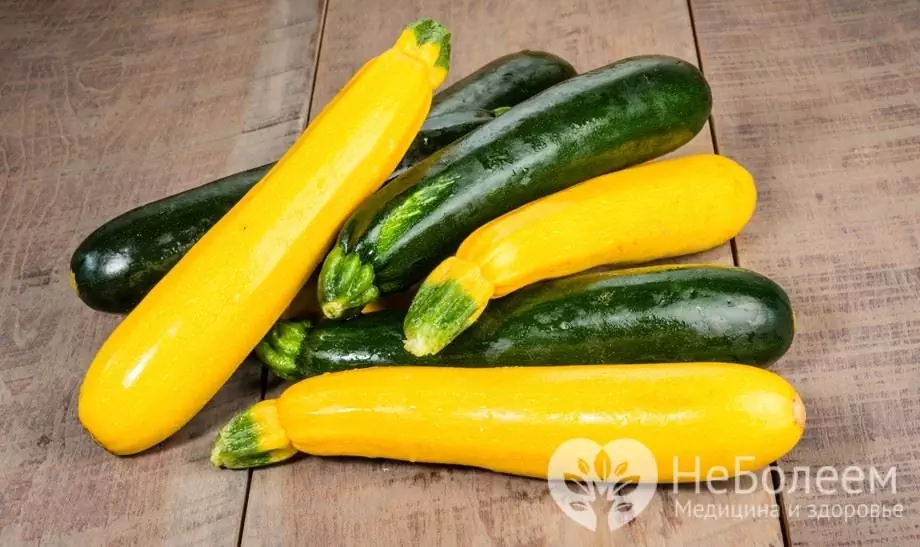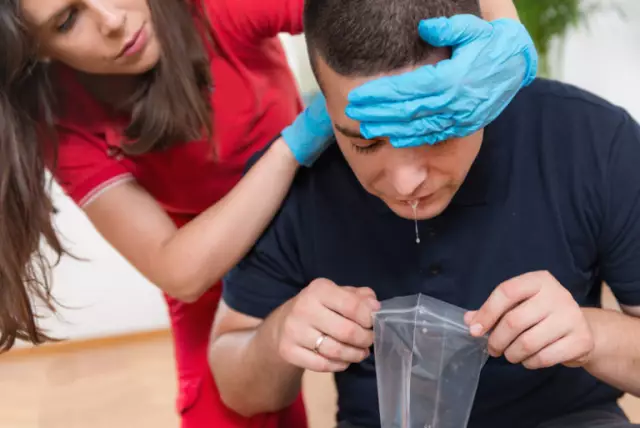- Author Rachel Wainwright wainwright@abchealthonline.com.
- Public 2023-12-15 07:39.
- Last modified 2025-11-02 20:14.
Zucchini poisoning
Zucchini is a delicious and healthy vegetable widely used in cooking. Zucchini dishes are popular with weight-conscious people who follow the principles of healthy eating, as they are healthy and low in calories.

Source: depositphotos.com
Zucchini carbohydrates have a low glycemic index, so this vegetable is recommended for people suffering from diabetes of any type.
Zucchini puree is recommended as one of the first complementary foods for children of the first year of life, since it is easily absorbed by their body and almost never causes allergic reactions.
When eating low-quality zucchini or dishes from them, a person may develop poisoning.
How does zucchini poisoning happen?
The cause of zucchini poisoning is the following:
- nitrates;
- heavy metal salts;
- Clostridium botulism;
- pathogenic microflora, leading to the development of gastroenteric syndrome (shigella, streptococcus, staphylococcus, proteus and Escherichia coli).
When vegetables are grown along major highways or in the protective zone of toxic industries, squash can accumulate a significant amount of heavy metal salts. Nitrates accumulate in zucchini when unscrupulous farmers apply excessive doses of fertilizers to the soil. The consumption of such vegetables in food causes toxic damage to various organs and systems.
Zucchini poisoning, proceeding according to the type of gastroenterocolitis, is usually associated with a violation of sanitary and technological requirements and norms in the preparation of dishes from this vegetable and their storage. Pathogenic microorganisms, after entering the human gastrointestinal tract, actively produce toxins that have a negative effect on the mucous membrane of the stomach and intestines, causing its inflammation. This is manifested by vomiting, diarrhea, intestinal cramps.
The most life-threatening form of zucchini poisoning is botulism. Such poisoning occurs when eating poor-quality canned food, such as squash caviar. Violation of the cooking technology leads to the fact that spores of Clostridium botulism get inside the cans. They are able to maintain their viability even at a temperature of 100 ° C. In the absence of oxygen, bacteria turn into a vegetative form and begin to be active, producing one of the most powerful poisons - botulinum toxin, which affects the nervous system. Its action is to block the transmission of nerve impulses from the nerve fiber to the muscle cell, which becomes the cause of muscle contraction disorders. Such disorders can lead to respiratory paralysis and, as a result, to death.
Poisoning symptoms
The clinical picture depends on what exactly caused the intoxication.
In case of poisoning with zucchini, associated with a high content of nitrates in it, the following symptoms are noted in patients:
- nausea;
- vomiting;
- diarrhea, in which the feces contain an admixture of fresh blood (or they acquire a chocolate hue);
- cramping abdominal pain;
- cyanosis of the lips and nail bed.
For zucchini poisoning caused by salts of heavy metals (thallium, lead, mercury, cadmium), the following are characteristic:
- bloating;
- diarrhea;
- irritation of the mucous membranes;
- pain in the abdomen;
- general intoxication.
A foodborne infection caused by eating substandard zucchini dishes usually presents with the following symptoms:
- nausea, which is further joined by vomiting;
- bloating;
- increased intestinal peristalsis, which patients perceive as rumbling in the stomach;
- diarrhea;
- abdominal pain;
- increased body temperature;
- weakness;
- lack of appetite;
- headache and muscle pain.
The first symptoms of botulism are similar to those of food poisoning, then they are joined by:
- visual impairment ("veil" before the eyes, diplopia);
- increasing muscle weakness, so much so that the patient cannot hold his head;
- shallow breathing;
- an increase in respiratory failure.

Source: depositphotos.com
First aid for zucchini poisoning
With any type of poisoning with zucchini, the victim should immediately begin to provide first aid, aimed at accelerating the elimination of toxic substances from the body.
First aid should begin with gastric lavage. The patient is given a few glasses of warm salted water or a pale pink solution of potassium permanganate to drink, after which they induce vomiting by acting on the nerve receptors in the region of the tongue root. It is advisable to repeat this several times in order to completely empty the stomach from the trapped toxins.
After that, the patient is given to drink a suspension of activated carbon, Filtrum STI, Smecta or any other medicinal preparation with a sorbing effect. This allows you to neutralize toxic substances that have penetrated into the lumen of the small intestine.
When is medical attention required?
In case of food poisoning with zucchini, correctly provided first aid in most cases quickly leads to an improvement in the condition of the victims, and they do not need medical attention. But there are a number of situations when you should see a doctor:
- symptoms of poisoning persist for more than 48 hours;
- poisoning happened in a child, pregnant woman or elderly person;
- the amount of urine separated sharply decreased, she had a rich dark color;
- severe abdominal pain;
- visual impairment;
- weakened shallow breathing.
Treatment of any type of zucchini poisoning begins with active detoxification therapy and measures to restore the disturbed water-electrolyte balance. Etiotropic therapy is also carried out, affecting the cause of the poisoning. So, if the poisoning is associated with salts of heavy metals, an antidote is administered - unithiol. For foodborne infections, broad-spectrum antibiotics can be prescribed. The main treatment for botulism is the administration of anti-botulinum serum.
Possible consequences
Zucchini poisoning, which proceeds as a common food infection, most often goes away without any negative consequences within a few days.
Serious consequences occur in case of poisoning with salts of heavy metals and botulism - this type of poisoning can lead to serious damage to internal organs with the development of their failure, and even cause death.
Prevention
To reduce the likelihood of zucchini poisoning, you should follow the rules:
- buy zucchini, especially those intended for baby food, only at trusted retail outlets;
- before starting cooking zucchini, wash them thoroughly under running water;
- when preparing canned food from zucchini, scrupulously observe sanitary rules, in particular, the sterilization regime;
- store zucchini dishes in the refrigerator in a closed container.
YouTube video related to the article:

Elena Minkina Doctor anesthesiologist-resuscitator About the author
Education: graduated from the Tashkent State Medical Institute, specializing in general medicine in 1991. Repeatedly passed refresher courses.
Work experience: anesthesiologist-resuscitator of the city maternity complex, resuscitator of the hemodialysis department.
The information is generalized and provided for informational purposes only. At the first sign of illness, see your doctor. Self-medication is hazardous to health!






